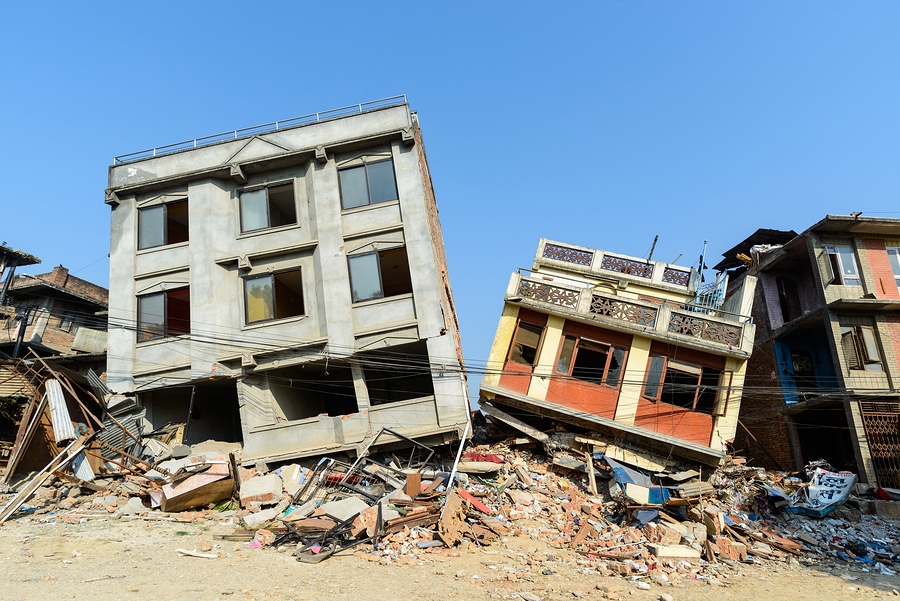Once considered rare or unusual occurrences, earthquakes are now daily events, in part because of better monitoring, and communication of the quakes. The United States Geological Survey (USGS) now estimates that several million earthquakes occur in the world each year, although many go undetected because they occur in remote areas or have very small magnitudes.In the U.S., the USGS now locates about 50 earthquakes each day, or about 20,000 a year. Oklahoma, for instance, had 623 earthquakes of 3+ in 2016; 903 in 2015; 579 in 2014; and 109 in 2013. According to E&E News (a news organization focused on energy and the environment), it's the most seismically active state in the lower 48. The quakes are believed to be manmade, due to fracking and oil drilling, but still, they're quakes and still do damage.
The Most Earthquake Prone States
According to the USGS, as of 2014, Alaska accounted for about half of all US earthquakes. Hawaii is the third-most prominent earthquake state, and Nevada is fourth. However, the USGS site reports that these states "are in a virtual dead heat on the number of quakes with a 5.0 or greater magnitude." Top 10 states for earthquakes include Washington, Idaho, Wyoming, Montana, Utah, and Oregon. They may be dangerous states to live in, but they're also among the most beautiful states in the country. So people move there, regardless of the threat of natural disaster. If you're one of those, here are some things you should know.
Buying a Home in an Earthquake Zone
So what does it mean to buy a home in an earthquake zone? You need to know that damage from an earthquake can happen whether your home is directly on a fault, hundreds of miles away, or simply on the wrong kind of soil. If you are buying a home in an area you know, or suspect to be earthquake prone, before you buy:
- Request a copy of the property's Natural Hazard Disclosure Statement (NHDS). Under the California Civil code real estate sellers and brokers are legally required to disclose if the property being sold lies within one or more state or locally mapped hazard areas. The law specifies that the six (6) required hazards be disclosed on a statutory form called the Natural Hazard Disclosure Statement (NHDS).
- By law, California Realtors are required to give you a copy of the Homeowner's Guide to Earthquake Safety.

California State Law also requires the seller to:
- Inform the buyer about known home weaknesses
- To strap the water heater to reduce the chance of it falling and causing water and gas lines to break
- To give buyers a Natural Hazards Disclosure form telling the buyer whether the home is in an Earthquake Fault Zone or in a Seismic Hazard Zone.
- To complete the Residential Earthquake Hazards Report.
Other things you should know about buying a home in an earthquake zone:
- Understand that being further from a fault does not mean you are at less risk from seismic hazards. Damage is often directly related to areas prone to severe ground shaking and liquefaction. Knowing you're in or near a fault zone is important, but so is knowing what kind of soil, or rock, your property is on.
- Have a certified home inspector, licensed building contractor, architect, or engineer inspect the house and give you a report on the earthquake weaknesses and an estimate of costs to strengthen those weaknesses.
- Hire a licensed geotechnical engineer and/or engineering geologist to check the stability of the land under the house and give you an assessment report on their findings. Certain types of soil are more prone to liquefaction and thus damage, during a quake. The assessment report you receive should include a geological map, which shows the locations of known fault traces. If the report shows a fault trace under the parcel walk away. Not only will you not be able to build within 50 feet of the fault, a seismic event of any level could damage your foundation beyond affordable repair.
- If the home is in an earthquake zone, as is most of California, then negotiate the cost of strengthening the house, if any is required, with the seller. California law does not require either you or the seller to strengthen the home, but if these weaknesses are not fixed, you may find that repair costs after a damaging earthquake can amount to more than the equity in your home.
- Visit your local planning department and speak with a City or County planner about earthquake hazards in the area.
- Consider buying a log or wooden home with modern joint construction rather than a brick, stone or concrete home. Log homes have a long history of surviving hurricanes and earthquakes because heavy timbers are strong and flexible, and stick built wood homes tend to be stronger and lighter and more earthquake resistant as well. There have been many studies done on the strength of log homes in both earthquakes and hurricanes.

California isn't the only state where Realtors must disclose hazards. According to the Chapman Law Review, there's a duty for all Realtors to disclose geological hazards in real estate transactions. So, no matter where you're buying, ask your Realtor what they know about earthquakes, floods, hurricane, and tornado risks. If they don't know, find out yourself before you buy.
